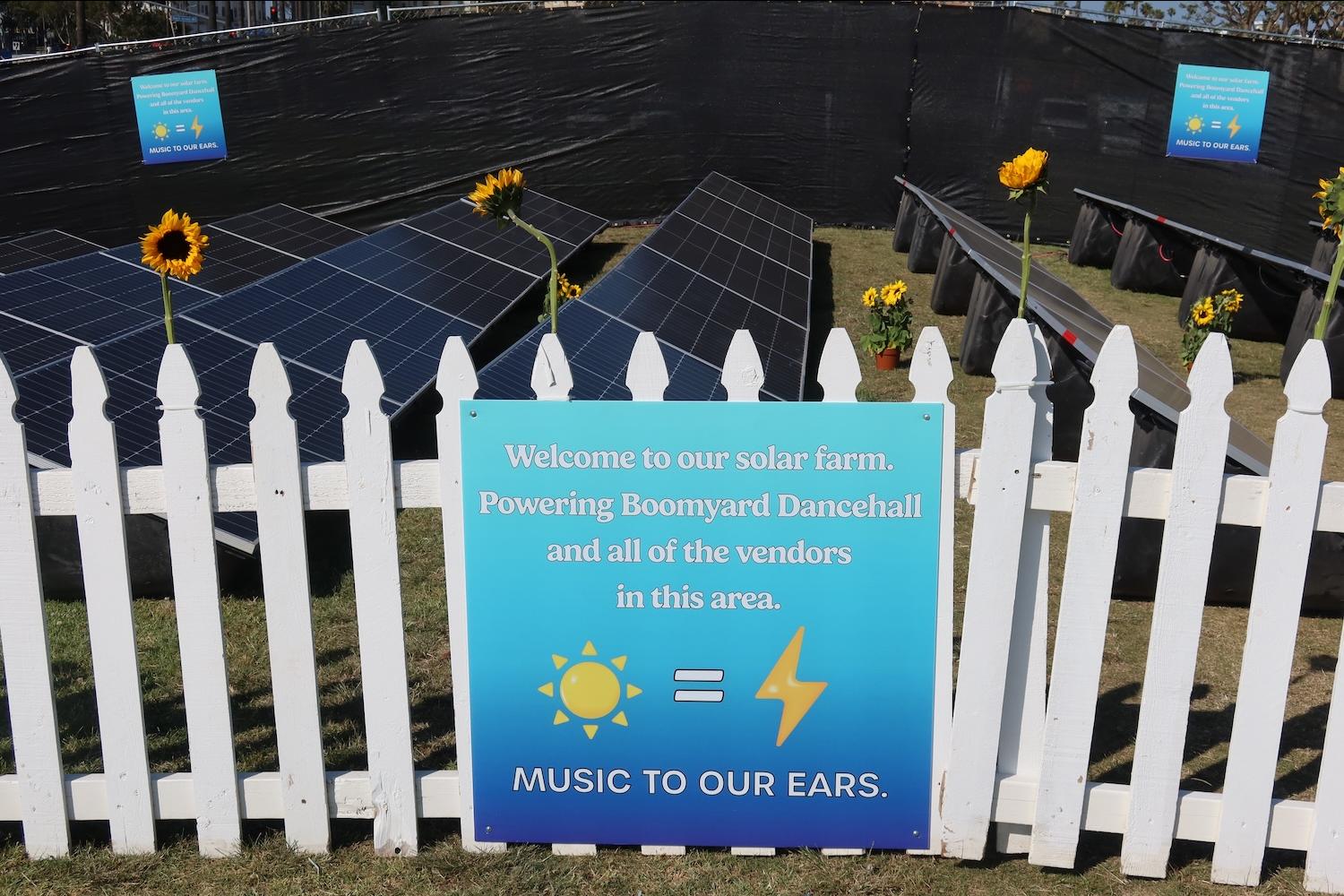
Summer music festivals are back in full swing. Surrounded by pulsing music and chaotic crowds, sustainability may be the last thing on your mind. But Goldenvoice, the company behind music venues and festivals like Coachella, Stagecoach and Cali Vibes, is working to lighten up festivals’ environmental footprints.
A subsidiary of the global sporting and live entertainment company AEG, Goldenvoice is applying the United Nations’ Sustainable Development Goals to its work tackling issues ranging from single-use plastics to renewable energy, one beat at a time.
Goldenvoice's evolving approach to sustainability at music festivals
The stage was set for Goldenvoice’s sustainability program a few years ago at the reggae, dancehall and hip-hop festival Cali Vibes.
“Jack Johnson was one of the headliners, and he's pretty notorious for having a very sustainable rider, so there were a lot of things in there that we have implemented into our practices,” said Meghan Tierney, senior manager of sustainable event operations at AEG, referring to the document that details an artists’ needs and requests for an upcoming performance. “It was the perfect storm in a good way … If Goldenvoice wasn't ready or excited about it, I don't think it would have gone as far — even with Jack's rider.”
Fortunately, AEG was on board, and it’s worked closely with the environmental consulting firm Three Squares Inc. to execute the ever-evolving program ever since. In general, the festival sustainability strategy encompasses carbon and energy, waste and materials, and water stewardship and engagement, said Jaime Nack, president and founder of Three Squares. Goldenvoice uses smaller festivals like Cali Vibes and Camp Flog Gnaw Carnival as testing grounds for new practices before scaling them up to the bigger stages like Coachella.
“A lot of the trials and testing are done in the eyes of the fans and attendees,” said Nic Adler, vice president of festivals at Goldenvoice. “At our San Francisco festival, Portola, you walk into the entrance of that show, and there's about 200 feet of fencing that separates a general admission area from a VIP area. We lined it with solar packs that were powering a dozen activations in the area. So, you walk in and you're like, ‘They weren't kidding, I'm seeing this with my own eyes.’”
Goldenvoice put a $1 to $5 sustainability fee on tickets to fund the effort, Adler said, yet when talking to attendees at the festivals, the reaction is surprisingly positive.
“Our fans and our guests, a lot of them are really knowledgeable about these things, and they're asking questions that are far deeper than surface level,” Tierney said. “I can tell that people are thinking it through, and it confirms for me that we're moving in the right direction, at least on behalf of our guests.”
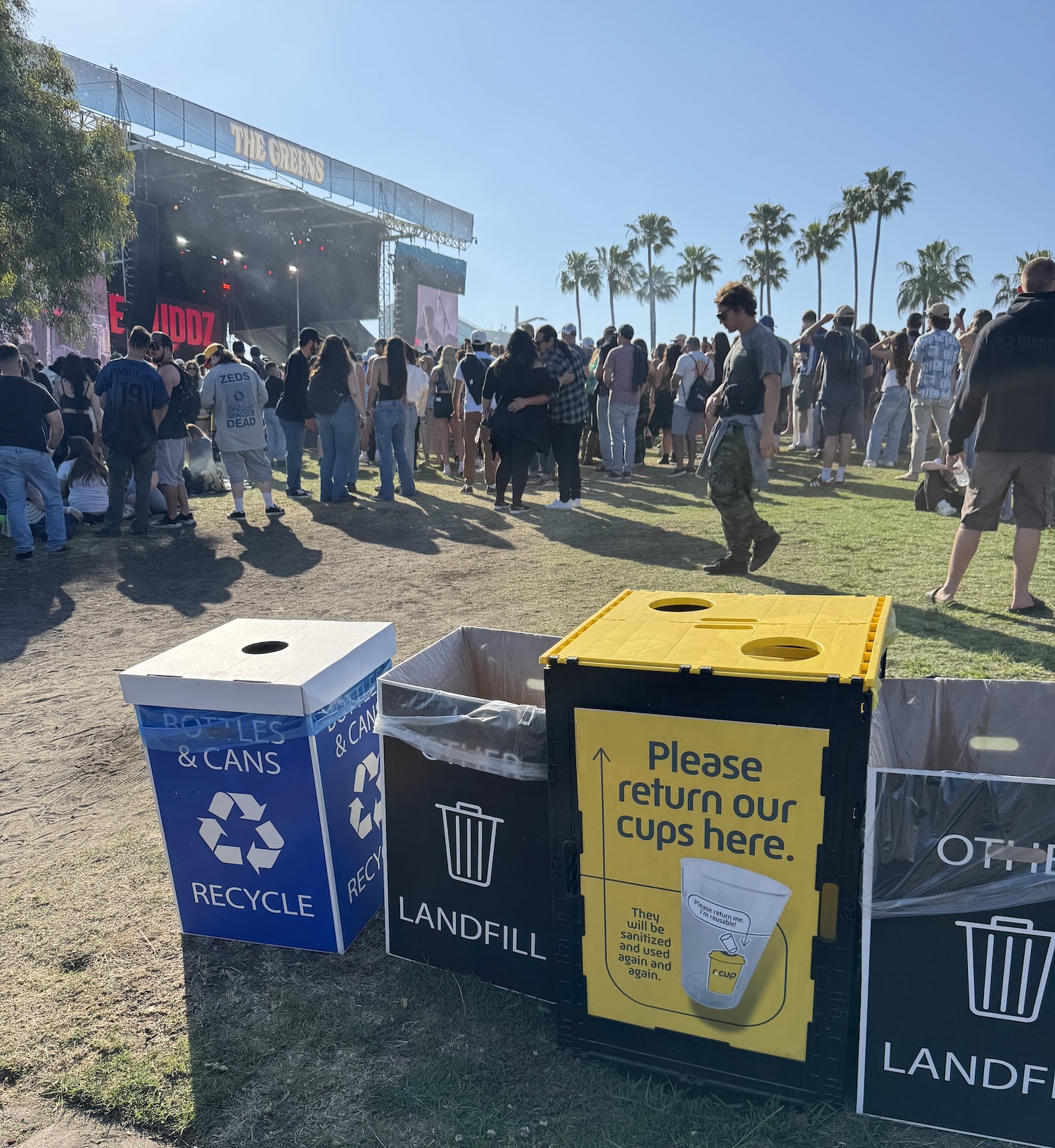
Tackling trash, from Camp Flog Gnaw Carnival to Coachella
Festivals can generate a lot of trash, so cutting down on waste is key. “We have a four-prong strategy of focusing heavily on reuse and rentals, so not building new sets and those types of things, along with recycling materials whenever possible and composting food waste,” Nack said.
For example, the company’s festival circuit has significantly reduced plastic use over the past decade, swapping out plastic straws, cutlery, and even cups at festivals and venues.
“At Camp Flog Gnaw Carnival in 2018, we had connected with r.World because — whether you work here or you don't — you could stand there and see cups piling up in trash cans,” Adler said. r.World produces reusable cups and packaging, which are collected in customized bins to be sterilized and used again. Its return rate is over 94 percent, sparing single-use plastics from the landfill and reducing carbon emissions.
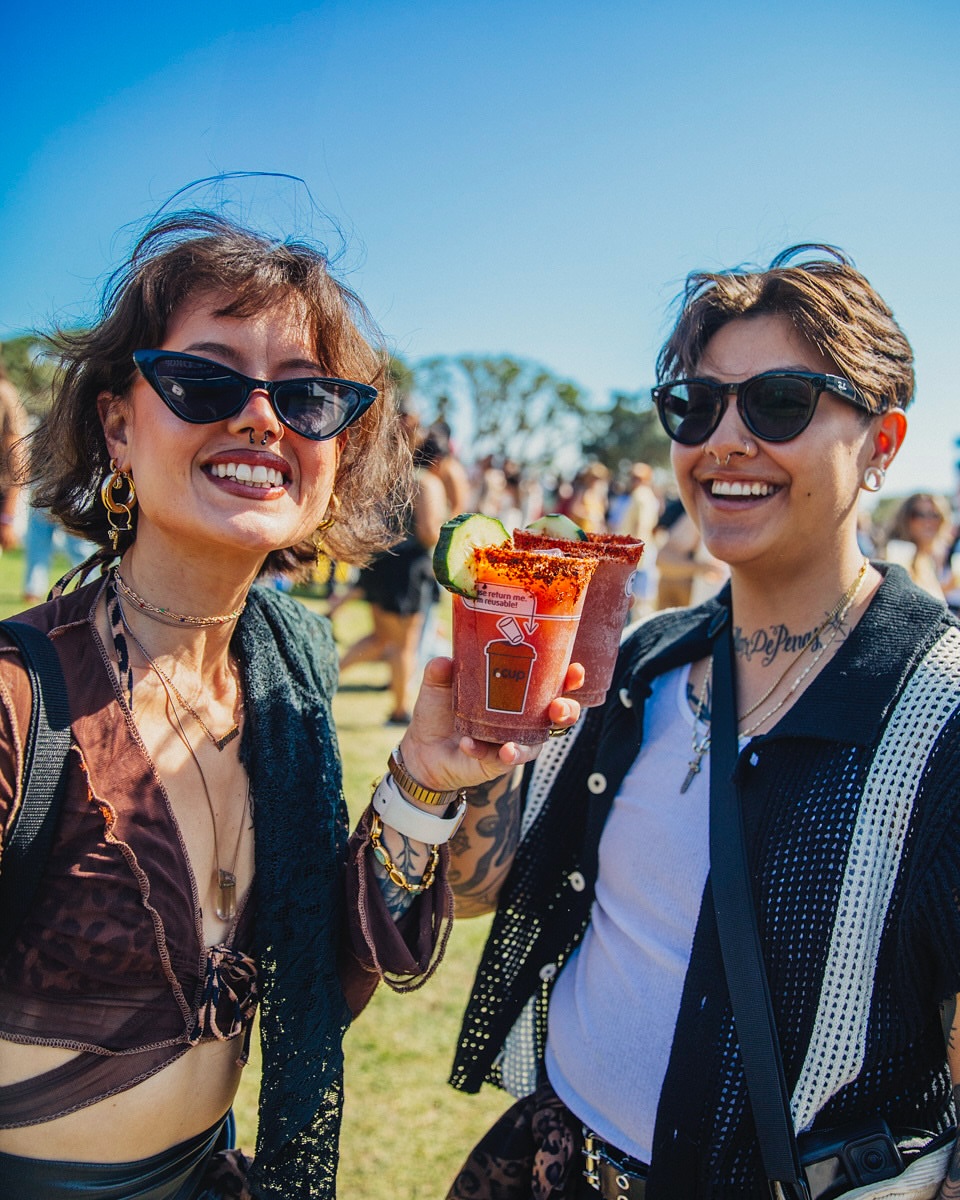
Goldenvoice also piloted recycling the thin-film plastic used in bags while encouraging attendees to bring their own water bottles. Things that are still in good condition after a festival but can’t be reused or rented are donated to charity, including food.
“Donation is definitely a huge part of our program, and it's been wildly successful,” Tierney said. “We do it at our regional festivals and especially out in our larger festivals in Indio — Stagecoach and Coachella.”
This quickly adds up. The company has donated almost 87,000 pounds of material and over 431,000 pounds of food and beverages from its festivals so far in 2025. Plus, materials left behind by campers — like tents, chairs, coolers and sleeping bags — are picked up by local charities.
Reuse factors squarely into Goldenvoice’s sustainability equation. At Cali Vibes, it reuses signs and set pieces, and it partners with a local design company that turns fencing scrim and banners into colorful bags, Nack said. Staffers from local colleges are on-hand to teach Cali Vibes attendees how to properly sort their waste into recycling, reuse, composting and landfill containers. Dumpsters are also clearly labeled with a color-coded system in English and Spanish.
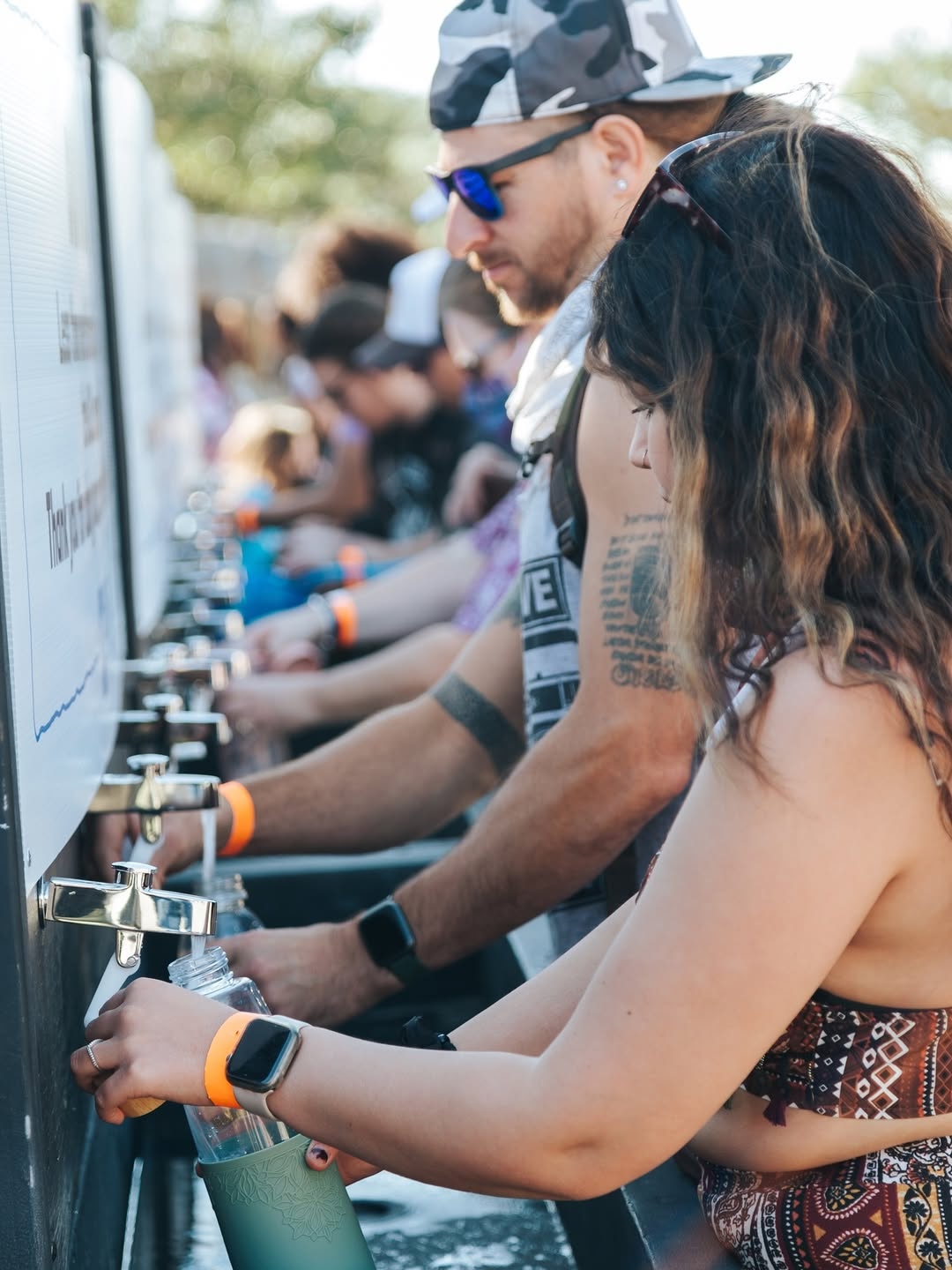
Cutting festival footprints, from carpooling to renewable energy
Besides tuning down waste, Goldenvoice is also tackling carbon emissions. “Not only are we tracking the carbon footprint of [each] event, but we want to make sure that wherever we can, we're reducing emissions from event-related activities,” Nack said. “We have anti-idling signs and messages about turning off your vehicles when you're loading and unloading. We also work with all of the production teams to make sure they're sourcing energy-efficient technologies and lighting systems and implementing a power down policy — so after your sound checks are done, everything's powered down and we're not keeping things running when we don't need them.”
Coachella attendees are encouraged to carpool and camp on-site to reduce driving, and Goldenvoice itself uses electric vans and shuttles for transportation and renewable diesel made from fats and oils to power events.
“All the generators we've switched to 100 percent renewable diesel,” Tierney said. “Just switching to that fuel alone is cutting lifecycle carbon emissions on our fuel on average by 65 percent.”
Additionally, some stages and systems are fueled by solar-powered batteries with the help of Overdrive Energy Solutions.
“At Goldenvoice festivals, Overdrive replaces traditional diesel generators with modular battery systems,” said Neel Vasavada, co-founder of Overdrive Energy Solutions. “We don’t just drop in batteries. We build out the full infrastructure — including power distribution and energy monitoring — to create smarter, cleaner, and cost-effective systems from the ground up.”
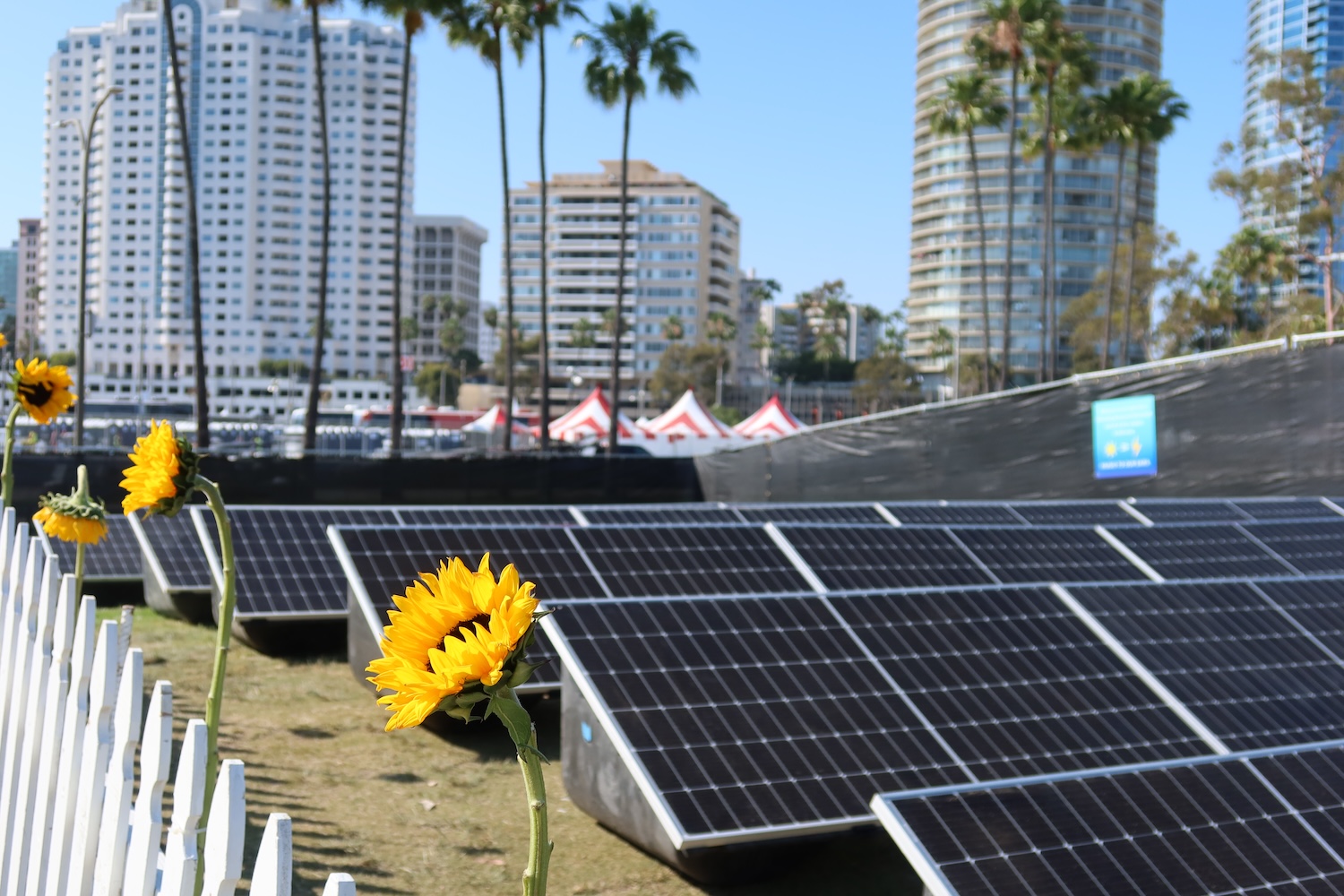
The sky is the limit from there, said Adler of Goldenvoice. “We're now looking at how do we power an entire festival off solar-charged battery packs? We're not 10 years away from that or five years away from that. We're a year away from seeing that take place at our shows.”
In turn, Goldenvoice’s methods are inspiring others, including the city of Long Beach, California — home to the Cali Vibes festival.
“The city department came, and toured, and they learned from us,” Nack said. “They learned something they wanted to take to all future events in Long Beach. That's a beautiful part of the legacy.”
But as the saying goes, it’s not always easy being green, as challenges come with making more sustainable swaps like running a whole festival on batteries. “We have to be careful because there's a level of trust we have built with artists, and we are in a competitive market,” Adler said. “If we make mistakes, then an artist can say, ‘I don't want to take that chance with my show.’ We have batteries on our stages, and we also have three diesel generators that might be sitting idle, ready to back them up, so we're not [fully] there yet.”
Music festivals are a big business worth over $2.1 billion globally, with a projected annual growth of 24 percent in the coming years. Fortunately, Goldenvoice is in tune with a larger group working to mitigate the industry’s impact, and with their innovation mindset, sustainable change is spreading.
“At every single show, there is something we haven't seen before in this space, and we bring the right people over and everyone starts getting ideas instantly,” Adler said. “It's an exciting time. Big changes are coming to this industry, and it's been great to be riding along with it.”
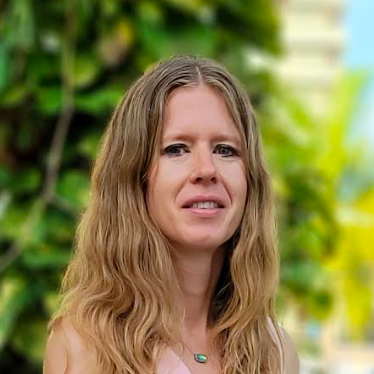
Ruscena Wiederholt is a science writer based in South Florida with a background in biology and ecology. She regularly writes pieces on climate change, sustainability and the environment. When not glued to her laptop, she likes traveling, dancing and doing anything outdoors.














